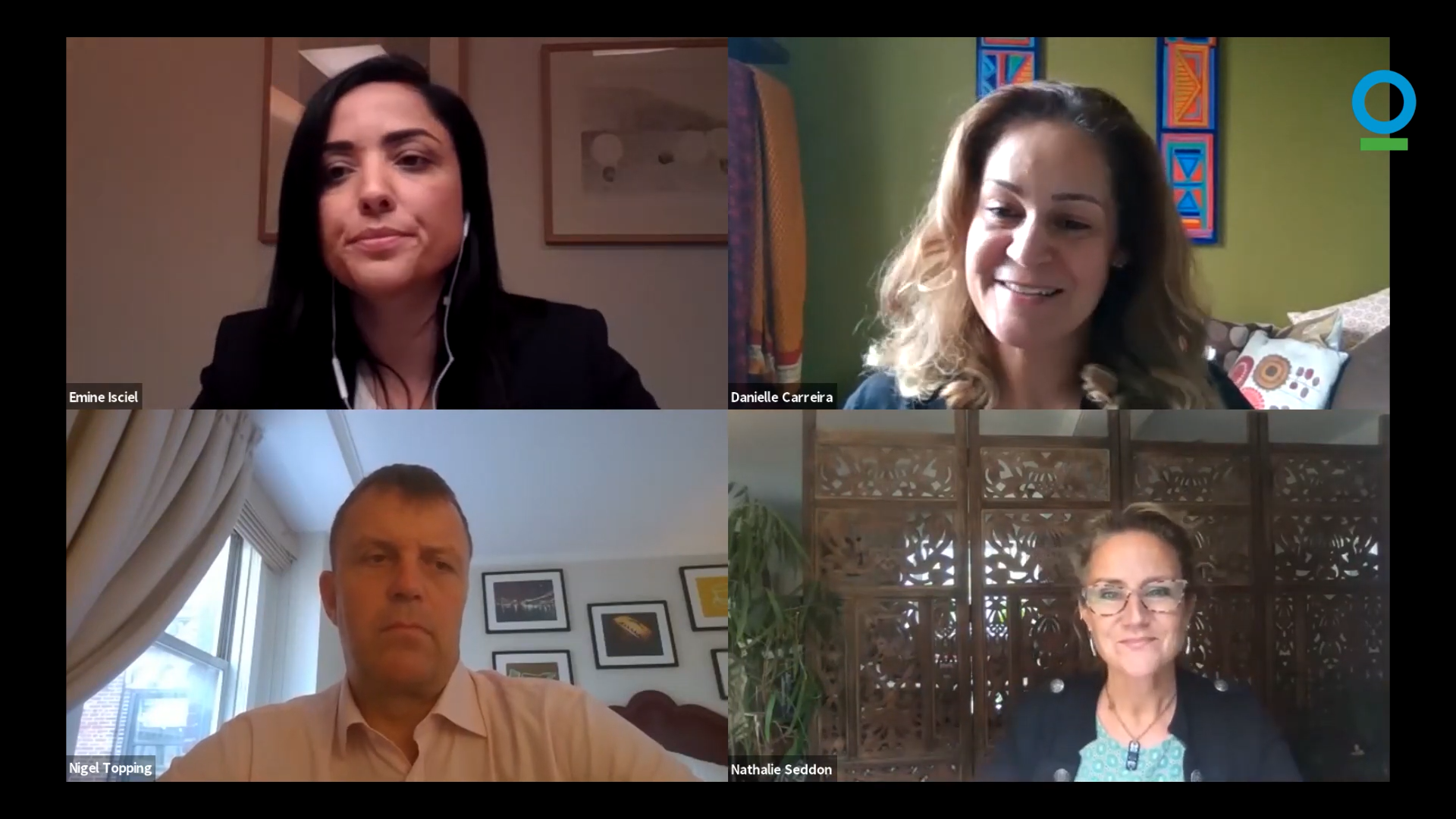Panel discussion on Deforestation-Free Finance at Climate Week NYC

NbSI Director Professor Nathalie Seddon recently spoke at Climate Week NYC in a panel session on Deforestation-Free Finance by 2025, hosted by Conservation International, Nature4Climate, Tropical Forest Alliance, Global Canopy, and Climate Champions. Moderated by Danielle Carreira of WEF Tropical Forest Alliance, the panel also included Climate Champion Nigel Topping, and Emine Isciel, Storebrand Head of Climate and Environment.
Emine Isciel shared Storebrand‘s deforestation-free journey, and emphasized the need to act now as “waiting for the perfect data can become an excuse for inaction ….but there are tools out there.” Nigel Topping also highlighted the need to find the good work that is already happening, to break down political barriers to get it to scale at the pace needed. Topping added that there is a need to move from “bold statements to practical action”, and urged financial institutions to commit to the race to zero, and to commit to going deforestation-free by 2025. Rt Hon Lord Goldsmith spoke in a pre-recorded video message, emphasizing the need to re-purpose the “subsidies and incentives that are driving the destruction of nature and shift them to more sustainable agriculture and towards renewal… We have all the knowledge, tools and technology we need to use land much more sustainably than we do today and to build new markets for nature and carbon and to measure our progress. we just need to scale up, and fast.”
Nathalie discussed the links between finance and deforestation, and the urgency of implementing nature-based solutions. She highlighted that NbS such as protecting and restoring forest ecosystems are not a replacement for carbon emissions reductions, but there is a key set of roles that Deforestation-Free Finance can play:
- Stopping loss and damage to our natural ecosystems across the globe is a critical component of mitigating and adapting to climate change – therefore meeting the twin goals of the Paris Agreement to keep average global warming to below 1.5 degrees and to enhance adaptive capacity and reduce vulnerability to climate change. Existing biodiverse ecosystems, particularly intact old growth tropical forests, have the potential to continue to provide climate change mitigation and act as net sinks of greenhouse gases for centuries – if they are carefully and ethically stewarded.
- As well as stopping deforestation, we must avoid damage and degradation through fragmentation, & selective logging, pollution, invasive species, shifting agriculture, and over-hunting. By damaging ecosystems we lower their resilience to climate change impacts and other stressors, such as wildfires and disease. This in turn lowers resilience to those threats and increases the chances that they will return their stored carbon back into the atmosphere, and stop providing all the other vital services to people (livelihoods, erosion control, pollination services and more).
- We need to stop funding ecosystem loss and damage with agricultural subsidies and must re-purpose fiscal savings for sustainable agriculture and ecosystem stewardship. We need to incentivise & boldly regulate cleaning up supply chains by 2025/2030, including through investing in nature-based solutions. We need ambitious commitments backed up by robust evidence action plans to ensure a sustainable future for #nature and people.
Understanding the drivers of deforestation is also key to achieve change. The majority of complete deforestation (permanent loss of forest) is driven by commodity production (palm oil, soy, and pasture for beef and dairy production), and despite corporate commitments, it has not declined. Such commodity-driven deforestation must be tackled by:
- Rapid phase-out of agricultural subsidies and re-purposing those fiscal savings towards more sustainable, equitable and efficient ways of supporting agriculture (including nature-based agricultural practices such as agroforestry and silvopasture).
- Cleaning up global supply chains given that there are currently many multiples more of financial incentives to degrade and destroy ecosystems than to protect them.
- Mandatory due diligence to assess impacts on the climate, biosphere and local people, and to mitigate these, including by investing in robust NbS within supply chains (a process termed “insetting”).
Broad support for these 3 key actions to tackle commodity-driven deforestation, in particular by the G20, will help keep the 1.5 degree climate goal alive whilst increasing our chances of meeting our adaptation and biodiversity goals this century.
Watch the full panel session recording online, and learn more about the week’s events on the Climate Week NYC website.




